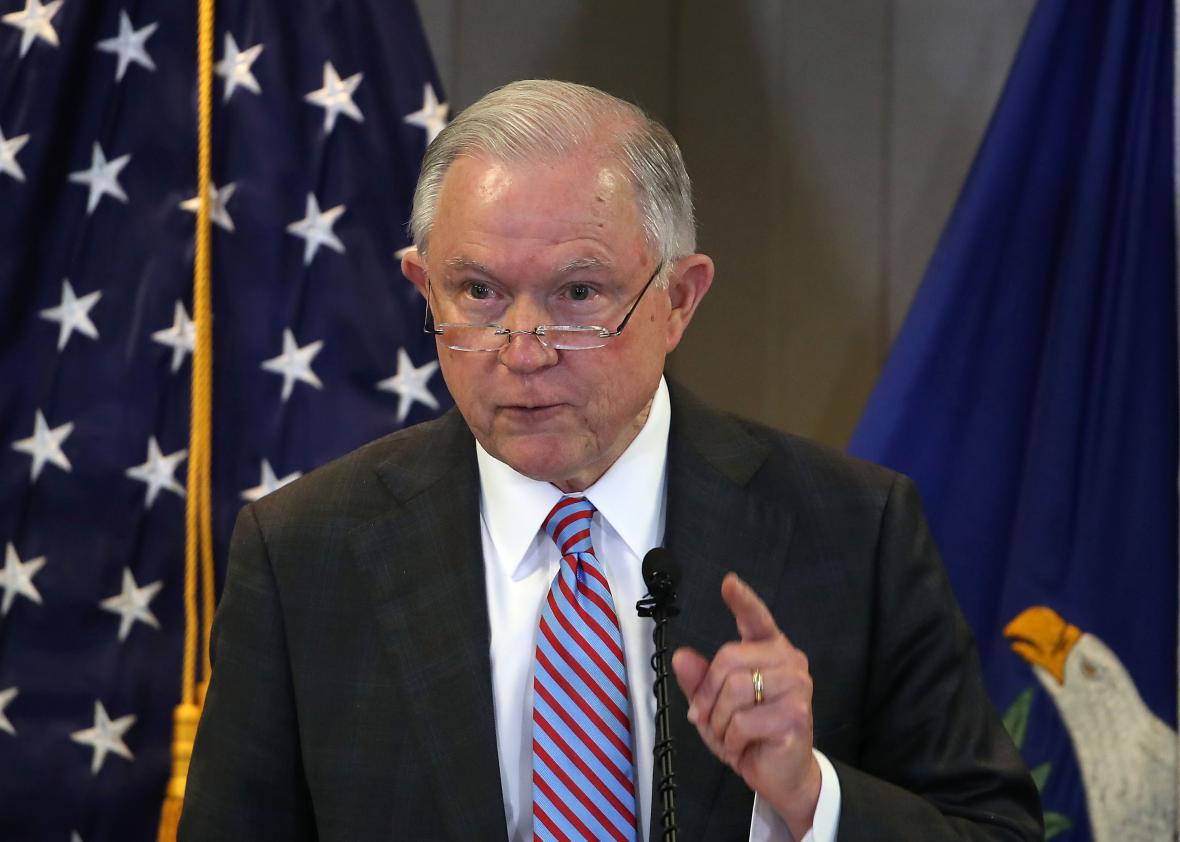In a move entirely consistent with his long career as a staunch advocate for tough sentencing, Attorney General Jeff Sessions is reported to have sent a federal prosecutor to assist in the state prosecution of an Iowa man accused of murdering a young black student who transgressed binary norms of gender, identifying as both male and female. The New York Times, HuffPost, and other outlets described the move as “def[ying]” and “confound[ing]” Sessions’ image and history on civil rights. But Sessions’ decision to aggressively prosecute individuals and ignore systemic discrimination is neither surprising nor indicative of a shift in his stance on civil rights. The reality remains that Sessions does not care about transgender and gender non-conforming individuals.
In fact, Sessions is an architect of the very types of discrimination that lead directly to the premature deaths of individuals like Kedarie Johnson, whose death he now seeks to avenge through the prosecution of Jorge Sanders-Galvez, who is accused of Johnson’s murder. (Jaron Purham has also been charged; he is awaiting extradition in Missouri.) Since assuming his current post, Sessions has taken every opportunity to limit legal protections for transgender and gender non-conforming individuals. In one of his first acts as AG, Sessions rescinded the extensively researched guidance from the Obama administration’s Justice and Education departments protecting transgender youth from discrimination in schools. He later issued a directive revoking a memo from former Attorney General Eric Holder explaining that the federal government would interpret the Civil Rights Act to encompass discrimination against transgender employees.
By advocating for a world in which transgender individuals are not protected from discrimination in school or the workplace or foster care or in homeless shelters, Sessions is ensuring that transgender individuals, particularly transgender women and femmes of color like Kedarie Johnson, are vulnerable to violence. He may believe in punishing an individual who allegedly murders a transgender person, but it is Sessions himself who creates the conditions in which that murder takes place. The transgender young person who can’t go to school and can’t get a job will be more likely to experience homelessness, more likely to face criminalization, more likely to die young from illness, from prison, from suicide, from murder.
CUNY Geography Professor Ruthie Gilmore’s definition of racism as “the state-sanctioned and/or extra-legal production and exploitation of group-differentiated vulnerabilities to premature death, in distinct yet densely interconnected political geographies” is instructive for understanding the nature of Sessions’ hypocrisy. Our legal system would have us locate violence only in the minds and hearts of individual bad actors. Sessions benefits from our reliance on that framework, since the solution becomes putting the bad actor into prison and the audience—the public—never looks at the ways in which the government facilitates premature death through its structures and policies.
As the Sylvia Rivera Law Project, a collective organization in New York City working toward gender self-determination, explained of hate crimes laws in 2009: “Hate crime laws are an easy way for the government to act like it is on our communities’ side while continuing to discriminate against us.” This is precisely what Jeff Sessions has accomplished here: hypocritically proclaiming concern for the life and death of individuals he has already committed to targeting with the entire weight of the federal government while legitimizing the operation of the prison system and sending a young man of color to prison—possibly for life, and maybe even to death.
Indeed, as the Sylvia Rivera Law Project has noted in the past, “[a]ny legal weapon that’s created to make our justice system more harsh and punitive cannot be trusted in the hands of institutions that have shown their prejudices and corruption time and time again.” The tool of the penalty-enhancing hate crimes prosecution serves Sessions’ agenda to lock more people away for longer while doing nothing to counteract the violence that too many in the trans community routinely face.
Here, Sessions also likely seeks to accomplish a second goal: He can bolster his legal argument that only laws that explicitly reference gender identity, and not those prohibiting sex discrimination, protect transgender people. This strategy animates not only his actions rescinding Obama-era guidance about the enforcement of federal civil rights laws, but also the prosecutorial decisions made in the Johnson case. Unlike Title VII and Title IX, which prohibit discrimination in employment and education on the basis of “sex,” the Matthew Shephard and James Byrd Jr. Hate Crimes Prevention Act explicitly targets hate crimes on the basis of “gender identity.” The goal, then, for Sessions is to say: “Now here’s a law that says the words ‘gender identity’ and therefore covers transgender people, unlike those sex discrimination laws.”
Just as we cannot be lulled into complacency by the idea that a single hate crimes prosecution somehow changes the reality that our government is systemically targeting transgender individuals for discrimination, we must stay vigilant and call out the Sessions DOJ for attempting to obscure the existing protections for transgender individuals under federal civil rights laws. Decades of case law establishes that sex discrimination encompasses discrimination on the basis of gender identity (and, for that matter, sexual orientation). Yet publications like the New York Times have been duped by Sessions’ messaging, editorializing in their reporting that “[d]uring the Obama administration, the Justice Department pushed the boundaries of civil rights, routinely arguing for a broad reading of the law.” Of course, Obama’s DOJ did no such thing. The Obama administration merely followed the law as it had been developing in the courts for years, developments that Sessions’ DOJ ignores.
I cannot think of a worse consequence of Johnson’s death than allowing their story to be co-opted by Sessions and other law enforcement officers as a symbol of sympathy for a community they seem committed to decimating. If we lose sight of the narrative they are building, we lose the fight over what our lives and deaths can mean.
